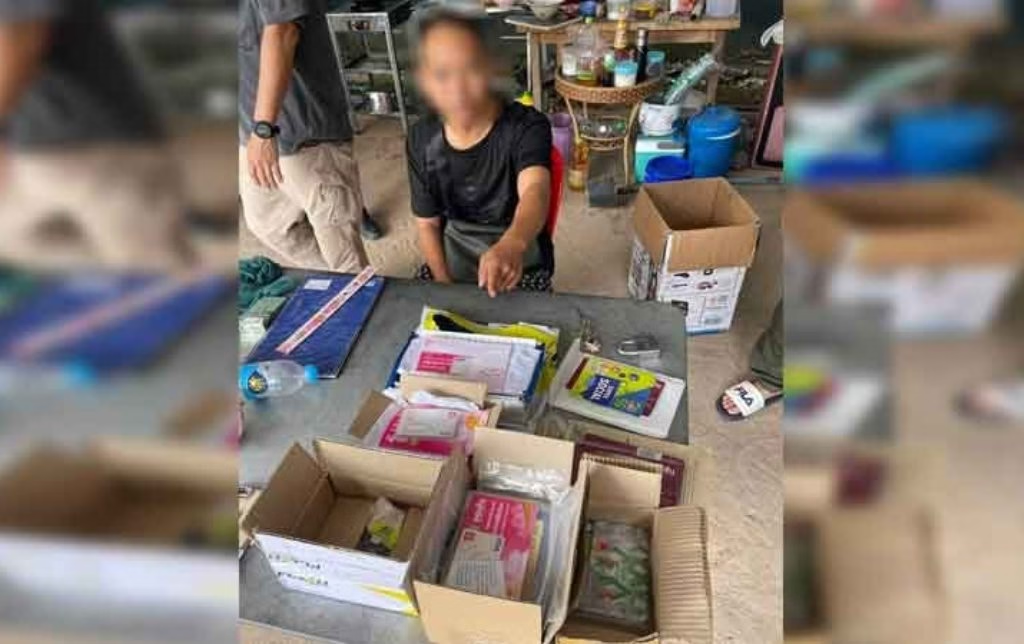CHIANG RAI – Chiang Saen police arrested a man accused of handling mule accounts for a cross-border group, after tracking parcels believed to contain bank books, electronic cards, and SIM cards headed to Laos. The suspect told officers he earned 10,000 baht per month for the work.
On 20 Oct 2025, the investigative team from Chiang Saen Police Station, acting under the direction of Pol. Maj. Gen. Manop Senakul, Chiang Rai Provincial Police Commander, and Pol. Col. Anuphan Kantharat, Superintendent of Chiang Saen Police Station, launched an operation targeting the trade of mule accounts in Chiang Saen district, Chiang Rai.
Officers received intelligence about parcels containing bank passbooks, e-cards, and SIM cards being sent via a private courier. The packages were to be dropped at the car park deposit point near the Golden Triangle permanent border checkpoint, Ban Sop Ruak, Moo 1, Wiang subdistrict, Chiang Saen. Police set up surveillance around the area and waited.
At about 1.05 pm, a private courier vehicle arrived and placed several parcels on a handover table in front of the parking area. Shortly after, a man approached to move the boxes. The team moved in and identified themselves as police.
The man was identified as Mr. Rungroj (surname withheld), 35, from Thoed Thai, Mae Fa Luang district, Chiang Rai. Six parcels were found grouped on the table. When questioned, he said the packages contained bank passbooks, electronic cards, and mobile phone SIM cards.
A detailed search confirmed the contents as 17 bank passbooks, 19 ATM cards, and 20 SIM cards packed inside the six boxes. Police also seized the suspect’s iPhone 8 Plus for further examination.
In his initial statement, Mr. Rungroj said he works at the car park and had been hired by a Chinese man living in Laos to receive the parcels. He said he had been paid 10,000 baht per month for about two months. A Thai intermediary handled the contacts and delivered the pay.
After he collected the parcels, another Thai man would pick them up and move them across to Laos. Police charged him with assisting or facilitating others in committing offences by making it easier for them to do so, regardless of whether the principal offenders knew of the help.
The allegation relates to the buying, selling, renting, or lending of deposit accounts, electronic cards, or electronic money accounts used to commit technology crimes or other criminal acts, under the Royal Decree on Measures to Prevent and Suppress Technology Crime, B.E. 2566 (2023). The suspect and seized items were handed over to investigators for legal action.
Mule accounts, or money mule accounts, are bank or e-wallet profiles used by criminals to clean illicit funds. People, often tricked or pressured, are recruited to receive and pass on stolen money, hiding where it came from. These accounts sit between the original crime and the final payout, mixing clean and dirty transfers to slip past checks.
Recruits are drawn in through fake job ads or social media offers. The risks are severe, including frozen accounts, criminal charges, and stolen identities. Banks worldwide lose billions to mule schemes each year, and the Cyber Police logged more than 14,000 cases in 2023.
The Golden Triangle, which covers parts of Myanmar, Laos, and Thailand, is a key centre for this activity. Spanning around 367,000 square kilometres along the Mekong and Salween rivers, it has long produced most of the world’s opium and heroin.
UNODC estimates put output at 80 to 90 percent at its peak. Synthetic drugs now dominate, with methamphetamine leading the trade, and seizures topping 1,000 tonnes in 2024. Production and trafficking are driven by insurgent groups, ethnic militias, and corrupt officials, generating an estimated 50 to 100 billion dollars a year.
Mule accounts fit neatly into this system. Drug profits move through loose borders into Thai banks, Chinese digital payment platforms, and global cryptocurrencies. Human trafficking rings recruit vulnerable locals to act as mules, while online crime groups target young people across Southeast Asia.
Thailand’s 2024 crackdown led to 5,000 mule arrests tied to Golden Triangle networks. Progress remains slow due to cross-border strains and limited cooperation. The result is a cycle of poverty, addiction, and organized crime that crosses borders. Breaking it calls for joint action, smarter monitoring, and support for at-risk communities.








